- Home
- Karen Traviss
Star Wars Republic Commando: Hard Contact Page 20
Star Wars Republic Commando: Hard Contact Read online
Page 20
“Certainly.”
“Why did you say of course you ‘re Niner?”
She paused. “You feel different. All of you. You might look the same, but you’re not. I don’t normally identify individuals by their effect on the Force, but I can if I concentrate.”
“We seem different to you?”
“You know you are, surely. You know you’re Niner and he knows he’s Darman. You’re as self-aware as I am, as any other human.”
“Yes, but. . .”
“All beings are individuals, and their essence in the Force reflects that. The act of living makes us different, and in that way you’re like twins, only more so. Atin’s very different. What happened to him to make him so burdened?”
The answer stunned Niner. He was used to being a product. His squad and his sergeant had treated him like a man, but the Kaminoans certainly hadn’t. This was the first time that a Jedi, a commander, had confirmed the clone commandos’ intensely private suspicion that they were no less than normal men. It was no longer a secret dissent that had to be hidden.
“Atin was the only survivor of his first squad, then he was reassigned and lost all three brothers in action again,” Niner said. “He feels guilty.”
“Poor man,” she said. “Does he talk about it?”
“Not much.”
“Perhaps I could help him see he has nothing to feel guilty about. Just a little encouragement. Nothing like the influence I used on the Weequay, I promise.”
“That’s kind of you.”
“We have to look out for each other.”
Right then Niner didn’t care if she had less idea of guerrilla warfare than a mott. She possessed one fundamental element of leadership that you couldn’t teach in a lifetime: she cared about those she led.
She had earned her rank on the strength of that alone.
“Contact, five hundred meters,” Fi said.
The squad abandoned their impromptu meal of stewed dried meat and put their helmets back on. Etain was again surprised at how fast they moved. They were lying prone in the undergrowth, rifles trained, in the time it took her to turn and check where the Weequay was.
You ‘re not going to make a sound, Guta-Nay. You want to be totally silent.
He was. But she felt what was approaching. She scrambled into the bushes on her hands and knees and leaned close to Darman. “It’s Jinart,” she said. “Relax.”
Darman, Fi, and Atin sat back on their heels. Niner stayed prone, still lined up on his sights, and held his hand away from the trigger in a conspicuous gesture.
“Niner likes to be sure,” Darman said. “No offense.”
The grass shook visibly, and then a living oil slick flowed past the kneeling commandos. It seemed to be carrying something horrific in its black swirls. The slick resolved itself into Jinart’s natural form, and she had a huge lump of raw meat in her jaws. She laid it on the ground.
“I gave you plenty of warning,” Jinart said, staring at Niner. She sniffed the air and appeared to follow an invisible beacon with her long snout. Her gaze settled on Guta-Nay, dozing against a tree, bound hands in his lap. “What possessed you to collect that souvenir?”
“We thought he might come in handy,” Fi repeated.
“You can’t even eat Weequays,” Jinart said, and metamorphosed into her human form. “Better not let the creature see me for what I am, just in case. Have you eaten? Would you like some merlie?”
Fi took his helmet off and grinned. “We’ve got time for that, have we?”
“You might as well fight on a full stomach,” Jinart said. “You have a tough job on your hands.”
Fi picked up the leg of merlie and rinsed it with water from his bottle. “Dar, you got any of that dried fruit left?” He ejected the vibroblade from his knuckle plate and began cutting the leg into chunks. Etain wondered how he had developed his relentless good humor; she couldn’t imagine him shooting anyone. One thing she had discovered in the last few days was that professional soldiers were neither habitually angry nor violent.
They didn’t even talk tough. They were a mass of contradictions. They washed their clothing and they shaved and cooked and generally conducted themselves like well-behaved, well-educated Padawans. Then they went out and blew up installations and killed total strangers and cracked bad jokes. Etain was getting used to it, but slowly.
While Atin kept an eye on Guta-Nay, the rest of them sat listening to Jinart in the shelter.
“I have been observing,” she said. “Hokan has made much of reinforcing the Neimoidian villa under strict security, and he does indeed have most of his hundred droids there. The whole building is packed with explosives, most of them in the wine cellars. But he has also moved Uthan back to the installation.”
“Our fragrant Weequay friend was right about the double bluff, then,” Etain said.
Niner shrugged. “It’s what I’d do. Defend the strongest position.”
“So we go for the installation, then,” she said.
“We’ll have to deal with both targets. They’re only two or three kilometers apart. Once we start on the main facility, the
droids from the villa will pop over for a visit in a matter of minutes.”
Etain rubbed her forehead. “If they followed the plans when they built the facility, then the only way in will probably be through the front door.”
Darman shrugged. “We can make our own doors. That’s what frame charges and water cuts are for.”
“Sorry?”
“We blow holes in the walls. But I’d rather avoid that if we’re dealing with hazardous materials. Don’t want to break any bottles, I reckon.”
“There isn’t even a fire exit. One door, no windows, no large ventilation shafts.”
“Doesn’t look like anyone enforces building regulations around here.” Darman shrugged. “Front door, walls, or drains. Walls would be best, but how we can get into position unnoticed is another matter.”
Niner looked at Darman as if waiting for a suggestion. “A split attack could divert them if it’s noisy enough.”
“Well, if Hokan’s been kind enough to load up the villa with things that go bang, it would be a shame for them to go to waste.” Darman studied the holochart plan of the villa. “They won’t fall for a droid bomb again, but we do have a lot of explosives we could introduce to the mix.”
“You make it sound as if it’s going to be relatively easy,” Etain said.
“No, it’s going to be hard. But that’s what we’re trained for.”
“I’d rather have you effecting rapid entry to the main facility,” Niner said.
“But we should place our own explosives inside the villa, in the cellars if we can,” Darman said. “A high-energy explosion will set off the rest of their charges. If we can place one, it’ll direct the blast upward, and if the droids are on top of the pile, it’ll solve that problem, too.”
“Okay, in real terms, there’s a layer of solid droid on top of the cellars. Can’t free-fall in. So it’s through the front
door, the wall, or the drains. And the drains look like thirty-centimeter diameter.”
“Bore-bangs?” Fi said.
“They won’t drill far enough into the ground to penetrate the cellars, and they’re not powerful enough anyway.” Darman’s gaze was fixed on the holographic plan. “Although they might be if Atin modified them and packed in a bit of the thermal tape. I was saving it for the blast doors in the facility, but I could spare a meter. That’d be ample.”
“How about a remote?” Atin said. “If we can direct it into the building, that is. If you took out the recording components, you could pack in the thermal tape—about a couple of meters, easily.”
“They’ll be able to spot anything that’s flying.”
Jinart, in aged crone mode, looked from face to identical face. “What size is this device?”
Darman formed a fist. “About this big. I’ll show you one.”
“I could carry that to the villa, r
ight to the walls, if you can direct it from there.”
Niner pointed into the shimmering image of the building. “Down the roof vent, which would put it in the main hall running front to back.”
“Or maybe along the main drain from this culvert about two hundred meters behind the house. I like that better.”
Etain joined in the communal ritual of staring at the holographic display as if an answer would eventually emerge on its own. “The only point in blowing up the villa is if you could hit as many droids with it as possible.”
“Then we have to convince them we’re going all out for the villa,” Niner said. “That means a feint of some sort, which would be fine if we had more men. But we don’t.”
Then Etain did have an idea, and it was one that she wasn’t proud of.
“How about sending Hokan a direct message?” she said. “What if Guta-Nay were to escape and tell him we were planning to attack the villa?”
“But he knows there are only four of us,” Darman said. “Sorry, five.”
“Six,” Jinart said sourly.
“We could convince the Weequay that we have another squad or two in the area,” Etain said. “At this point, he’ll believe anything I tell him. But I’ll be sending him to his death.”
Fi nodded. “Yeah, if Hokan skewers him without waiting to hear what he’s got to say, we’re stuffed.”
He was cheerfully, benignly callous. Etain was briefly appalled before letting the reality wash over her. Given the chance, Guta-Nay would have abused and killed her without a second thought. Aside from that, the squad’s target was effectively a weapons factory, a weapon that would kill millions of men just like Niner, Fi, and Atin. And Darman. If they didn’t kill, they would be killed.
It didn’t take her long to move from her reverence for all living things to thinking waste the Weequay. She wondered if that was the true nature of corruption.
“I’ll do my best to give him a good opening line,” Etain said.
“He’s scum,” Jinart said suddenly. “If his death can help remove the Trade Federation and all their minions from my world, then it is a cheap price to pay.”
My world? Etain obviously had the same thought as the commandos, because they all reacted, looking at the shape-shifter expectantly.
“We didn’t realize this was your homeworld,” Niner said.
“It is,” Jinart said. “I’m among the last of my kind. Various invaders have driven us from our habitat without even seeing us—and now I doubt they would have done any differently had they known we were here. Yes, we’ll help you rid this world of Neimoidians and every other hostile alien species that’s here. That’s our bargain with the Republic. You help us; we help you. That’s why we risk our lives. It is not for the greater glory of your cause.”
“Nobody told us,” Etain said. “I’m sorry. I can’t speak for the Republic, but we’ll do our best to see that they keep their word.”
“Mark that you do,” Jinart said. She indicated the com-
mandos with a swing of her fine black head. “Like your young friends here, we are few, but we have no problem inflicting a great deal of damage.”
Etain could only nod. At least Jinart was brutally honest. Perhaps telepaths, deprived of secret thought, had no other style of interaction. The creature was staring at her, all unblinking orange eyes, and she could see for the first time that the four fangs protruding over the Gurlanin’s lower lip each ended in a double point.
“I’ll place scent marks around this camp,” Jinart said stiffly. “The gdans won’t bother you tonight.” She slipped away and merged with the land, leaving a trail of rustling noises as she moved through the bushes.
“Okay, let’s see what Guta-Nay can manage,” Niner said. “If we don’t see signs of movement toward the villa by midday tomorrow, we’ll go in anyway, and that’ll mean splitting the squad and taking both groups of droids. We really don’t want to do that if we can help it.”
“This has the makings of a diverting evening,” Fi said. “Anyone for supper?”
It was an elaborate charade, and the bizarre thing was that it needed no rehearsal. Guta-Nay was entirely unquestioning: Etain had begun to see him as a monstrous and sadistic child, unable to comprehend the feelings of others, or control his own. They sat around and ate the merlie stewed with dried kuvara, talking about leaving enough for the “other squad” when it showed up. They discussed in hushed tones about how “the villa” was their target. If this was the misinformation game, it was an easy one.
Even so, Etain definitely didn’t feel proud of her subterfuge when she cut the ties around the Weequay’s wrists, ostensibly an act of kindness so that he could eat. It was designed to send him to his death. At least she felt some relief that as soon as it was dark, and they made a show of turning their backs on him and being preoccupied, Guta-Nay would try to escape, and vindicate Jinart’s judgment that he was scum.
The decision still sat heavy on her.
Fi and Darman were asleep, judging by the position of their heads. It was impossible to tell with their helmets on, but they were sitting against a tree, chins resting on their breastplates and arms folded over the rifles clutched to their chests. She had no doubt that if she walked over to them, they’d wake and be on their feet in a second.
She glanced up. Niner was on watch, perched in the fork of a tree with one leg dangling, occasionally peering down his rifle scope at something.
“What can he see?” she asked.
Atin, cross-legged with an array of wires and detonators spread around him, looked up. He’d taken off the armor section that protected his backside and was using it as a convenient plate for components while he worked.
“Line of sight? Up to thirty kilometers in good viz. Connected to a remote ship system? Well, you name it, Com— sorry, Etain.” He pointed to his rifle, and then went on packing tight-coiled black and white ribbons of explosive into the remote. “Have a look through the Deece. Safety’s on, but don’t press anything.”
Etain shouldered the rifle. It was a lot lighter than it looked, and the view through the scope was startlingly vivid despite the failing light. She found it difficult to shut out the display that was superimposed on her field of vision. It narrowed the view to a tight focus on the target. “Is this what you see through that visor?”
“Sort of.”
“Can I try the helmet? I want to know what it’s like to be inside it.”
Atin gave her a dubious look and shrugged. “You won’t get all the readouts without the rest of the armor system, but you’ll see enough. It’s top shelf. They upgraded it just for this mission.”
She lifted the helmet and held it above her head, a bizarre coronation. As she lowered it into place, the feeling of confinement and stifling heat almost made her nauseous, but she steeled herself to tolerate it.
“Hot,” she said.
“It’s fine when it’s sealed to the rest of the suit,” Atin said. He got to his feet and loomed in her field of vision. “See the red light in the top corner?”
“Mm.”
“Look at it and blink twice, fast.”
She did. It unleashed chaos. All she could see now was a riot of lines and numbers and flashing symbols. She was aware of a normal view beyond it, but the rest of the data dancing before her eyes was overwhelming.
“That’s the HUD,” Atin said. “Heads-up display. Real life-saver. The proverbial eyes in your backside.”
“It’s distracting. How do you cope with it?”
“You get used to it fast. We’ve used these systems all our lives. You can filter the information out, like listening to a conversation in a crowd.”
Etain lifted the helmet off and inhaled cool evening air. “And you can communicate without any audible sound outside the helmet?”
“Yes, and even without Command and Control hearing us on certain frequencies. I don’t think ordinary troopers can do that, but we’re different.”
“Separate specialized trainin
g?”
“They’re trained from day one to be more obedient than us. And we’re more obedient than ARC troopers. They’re pretty well raw Jango.”
He was talking about himself as if he were a commodity. Etain found it uncomfortable: yes, these young men were odd because they were externally identical, but they were still individual men, and not exotic houseplants or strains of grain. She understood that the Republic faced desperate times. She just wondered how many desperate measures that could justify. Somehow it seemed an affront to the Force to do this to fellow humans, even if they seemed remarkably sanguine about it.
She handed him back his helmet. “We use you, don’t we, Atin? All of you.”
“No soldier has it easy.” He fumbled with a length of wire, clearly embarrassed, brow furrowed in mock concentration.
The fresh scar from cheek to chin was all the more shocking etched into fresh young skin, and not a battle-hardened, wrinkled face that indicated a full life. “But I like this job. What else would I do?”
It was a painfully good question. What would any of them do if they were discharged from the Grand Army? She reached out and squeezed his arm instinctively, but all she grasped was plastoid-alloy plate.
“I know what happened to you,” she said. She concentrated, a precision job: just enough to influence him to see what was true and reasonable, but not to make mockery of his natural grief. “What happened to your brothers wasn’t your fault. You’re a good soldier. Sometimes the odds are too far against you.”
He stared down at his boots. Eventually, he looked up and shrugged. “I’ll do my best to make sure this bunch stays alive, then.” There was little indication on his face that the gentle push toward acceptance had worked, but Etain felt less of a jagged tear in the Force around him. He might heal, in time.
And time was something none of the clone commandos would have. It made her ashamed.
“Can I help with anything?” Etain said.
“You could help me put some remote dets into these. I told Dar I’d finish them for him.” Atin indicated small packs of mining explosive, and handed her something that looked like a packet of steel toothpicks. “Slide these between the ribbon and the main charge. Makes any party go off with a bigger bang.”

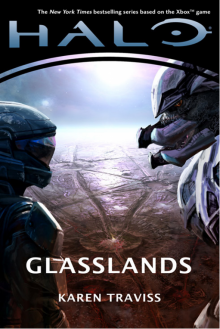 Halo: Glasslands
Halo: Glasslands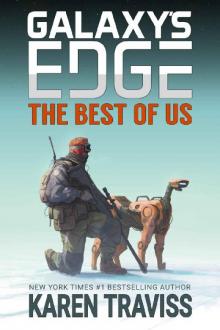 The Best of Us
The Best of Us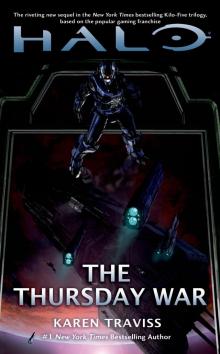 Halo: The Thursday War
Halo: The Thursday War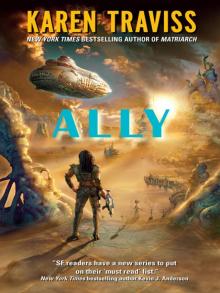 Ally
Ally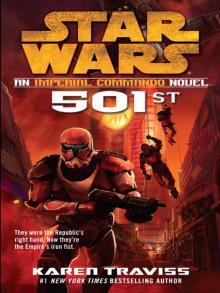 501st: An Imperial Commando Novel
501st: An Imperial Commando Novel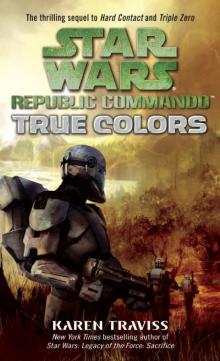 True Colors
True Colors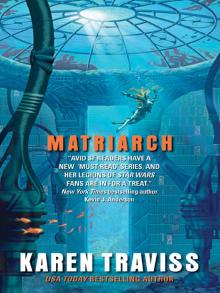 Matriarch
Matriarch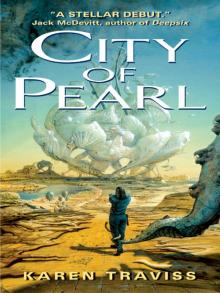 City of Pearl
City of Pearl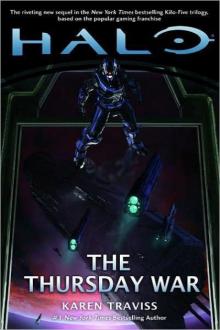 The Thursday War
The Thursday War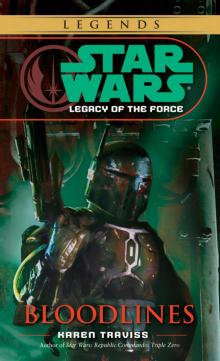 Bloodlines
Bloodlines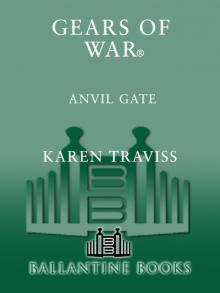 Gears of War: Anvil Gate
Gears of War: Anvil Gate Crossing the Line
Crossing the Line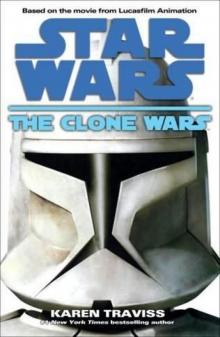 Star Wars - The Clone Wars 01
Star Wars - The Clone Wars 01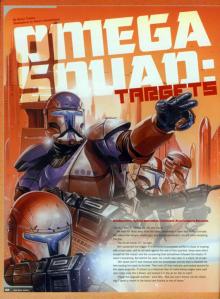 Omega Squad: Targets
Omega Squad: Targets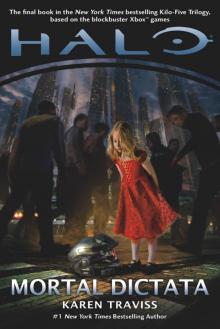 Halo®: Mortal Dictata
Halo®: Mortal Dictata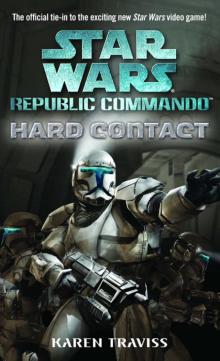 Hard Contact
Hard Contact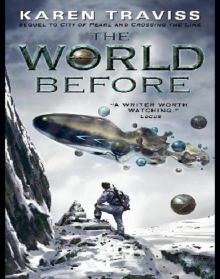 The World Before
The World Before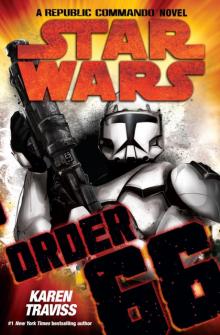 Order 66
Order 66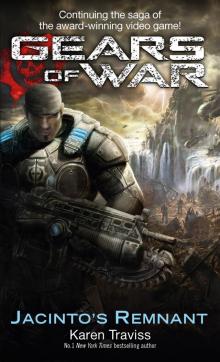 Gears of War: Jacinto's Remnant
Gears of War: Jacinto's Remnant Sacrifice
Sacrifice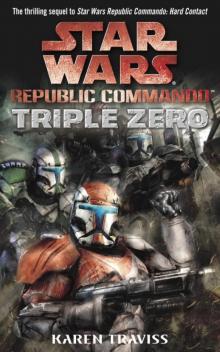 Triple Zero
Triple Zero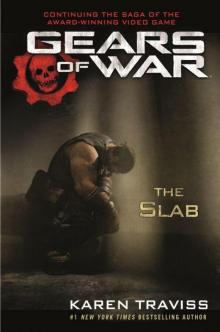 Gears of War: The Slab (Gears of War 5)
Gears of War: The Slab (Gears of War 5)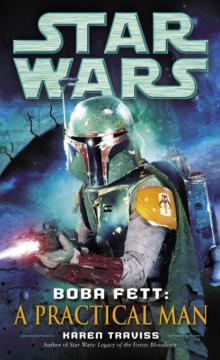 NEW JEDI ORDER: BOBA FETT: A PRACTICAL MAN
NEW JEDI ORDER: BOBA FETT: A PRACTICAL MAN Going Grey
Going Grey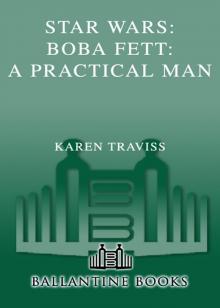 Star Wars: Boba Fett: A Practical Man
Star Wars: Boba Fett: A Practical Man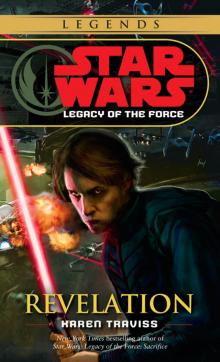 Revelation
Revelation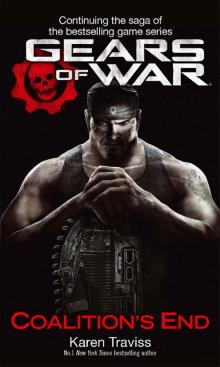 Coalition's End
Coalition's End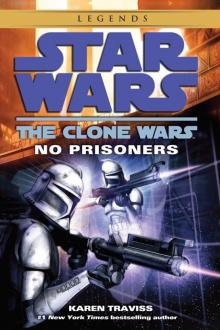 No Prisoners
No Prisoners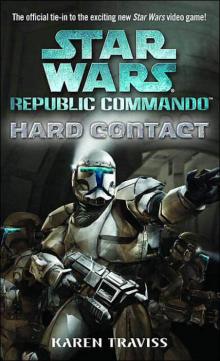 Star Wars Republic Commando: Hard Contact
Star Wars Republic Commando: Hard Contact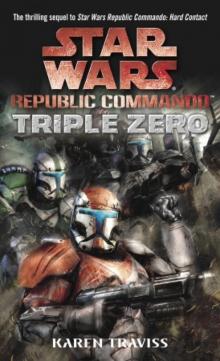 Star Wars: Republic Commando: Triple Zero rc-3
Star Wars: Republic Commando: Triple Zero rc-3 The Clone Wars
The Clone Wars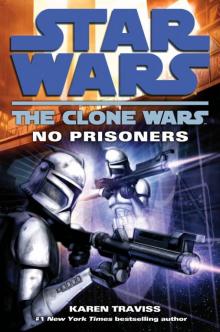 The Clone Wars: No Prisoners
The Clone Wars: No Prisoners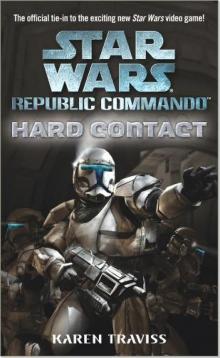 Star Wars: Republic Commando: Hard Contact rc-1
Star Wars: Republic Commando: Hard Contact rc-1 Judge
Judge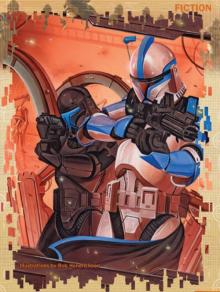 Omega Squad: Targets rc-4
Omega Squad: Targets rc-4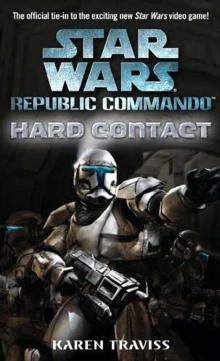 Star Wars - Republic Commando - Hard Contact
Star Wars - Republic Commando - Hard Contact